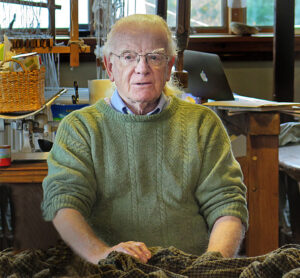 Norman Kennedy is possessed of a rare knowledge of Scottish traditional culture. A way of life now far removed from the modern day-to-day, but preserved in his deep understanding of craft and song.
Norman Kennedy is possessed of a rare knowledge of Scottish traditional culture. A way of life now far removed from the modern day-to-day, but preserved in his deep understanding of craft and song.
He was born and brought up in 1940s Aberdeen, the city then still not too far removed from its rural beginnings. His roots in the city dated back to the 13th century, for generations the Kennedys had been shipbuilders and merchant seamen. Like his forebears, his father worked in the shipyards, and spent time at sea. For a time his family lived across the road from Jeannie Robertson. Little then did he know how much of a role she would play in later years.
There was music and stories in Kennedy’s family. His mother hailed from the small village of Methlick, some 20 miles from Aberdeen. It was visiting relatives here that he began learning songs of the North East. He’d spend time at the local handweavers too, learning of this traditional craft.
He began learning Gaelic, undertaking to master the language by visiting the Outer Hebrides repeatedly throughout the 1950s. On Lewis he met Annie Johnston, who was once rightly described by Compton MacKenzie as “A perennial spring of Gaelic folklore”. Johnston quickly became Kennedy’s teacher and mentor. She instilled in him an understanding of the songs and stories as part of a way of life, having him complete a household chore or task for each that she gave him. Through these visits he learned the language and music, as well as expanding his knowledge of the crafts – teaching himself to card, spin and weave wool, as well as waulking the tweed.
Back at home, he became deeply involved in Aberdeen’s quickly evolving folk scene. Many years after they were neighbours, Kennedy befriended Jeannie Robertson and encountered others including bothy ballad singer Jimmy McBeath and traveller-musician Davie Stewart. Through these bearers of tradition, his repertoire and understanding increased even further.
He was one of the first members of the Aberdeen folk club when it first began in 1963. It was here that Mike Seeger first heard him sing, shortly after inviting him to represent Scotland at the 1965 Newport Folk Festival. Kennedy was a hit at the festival, having been invited back numerous times since.
America was equally as big a hit with Norman, who loved it so much that he went on to make his home there. Ever since, he’s devoted his energies to proliferating traditional crafts, songs and stories. From 1967 to 1972, Kennedy served as the master weaver at Colonial Williamsburg, later he founded the Marshfield School of Weaving in Vermont where he taught until it closed in 1995.
He’s spent time in the studio, first appearing on Topic Records’ 1965 release New Voices from Scotland, along with Gordeanna McCulloch and The Exiles: Bobby Campbell, Enoch Kent and Gordon McCulloch, before his debut solo release on Folk-Legacy Records – Norman Kennedy: Ballads & Songs of Scotland. On a return visit to Scotland in 1996 Tom Speirs recorded three concerts given in Aberdeen, releasing Norman Kennedy: Live in Scotland in 2002.
Kennedy was awarded a National Heritage Fellowship by the United States’ National Endowment for the Arts in August 2003. One of sixteen awardees that year, the fellowship was given in recognition of “a master traditional artist who has contributed to the shaping of our artistic traditions and to preserving the cultural diversity of the United States”.
It is clear though that Kennedy sees himself as part of something much bigger, saying: “These songs are my roots; they’re older and more important than I am.”
On Kennedy, fellow traditional singer Tom Speirs wrote for Living Tradition’s Tradition Bearers project:
‘In the heady days of the Folk Revival, very firm distinctions were drawn between ‘Traditional’ and ‘Revival’ singers. Norman refused to fit into either box. He wasn’t born on a farm, or in a travellers tent, but he learned his songs orally from those who had been. He was one of the few ‘toonsers’ to be afforded the reverence normally reserved for Traditional Singers and fits more perfectly than anyone else I can think of, the accolade of Tradition Bearer’.